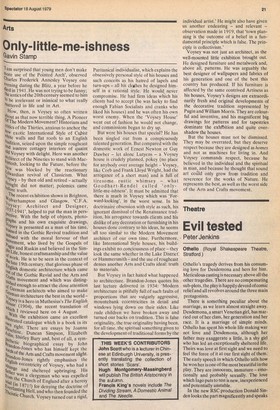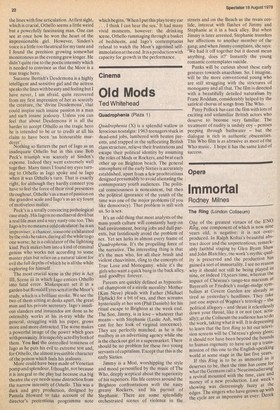Evil tested
Peter Jenkins
Othello (Royal Shakespeare Theatre, Stratford.) Othello's tragedy derives from his consuming love for Desdemona and hers for him. Meticulous casting is necessary above all the other tragedies. There are no compensating sub-plots, the play is happily devoid of comic relief and all revolves around the three main protagonists. There is something peculiar about the marriage, as we learn almost straight away. Desdemona, a smart Venetian girl, has married out of her class, her generation and her race. It is a marriage of simple minds. Othello has spent his whole life making war not love and Desdemona, although her father may exaggerate a little, is a shy girl who has led an exceptionally sheltered life. Theirs was love at first sight and we need to feel the force of it at our first sight of them. The early speech in which Othello tells how he won her is one of the most beautiful in the play. They are innocents, immature — emotionally and probably sexually. The love which Iago puts to test is new, inexperienced and potentially unstable. In the new RSC production Donald Sinden looks the part magnificently and speaks the lines with fine articulation. At first sight, which is crucial, Othello seems a little weird but a powerfully fascinating man. One can see at once how he won the heart of the impressionable girl. However, Sinden's voice is a little too theatrical for my taste and I found the precision growing somewhat monotonous as the evening grew longer. He didn't quite rise to the poetic intensity which is needed to convince us that the Moor is a true tragic hero.
Suzanne Bertish's Desdemona is a highly intelligent and sensitive girl and the actress speaks the lines with beauty and feeling but I have never, I am afraid, quite recovered from my first impression of her as scarcely the creature, the 'divine Desdemona', that could inspire such insane passion in a man and such insane jealousy. Unless you can feel that about Desdemona it is all the harder to accept Othello as the tragic hero he is intended to be or to credit at all his claim to have been 'an honourable murderer'.
Nothing so flatters the part of lago as an inadequate Othello but in this case Bob Peck's triumph was scarcely at Sinden's expense. Indeed they went extremely well together. Many times I found my eyes turning to Othello as lago spoke and to lago when it was Othello's turn. That is exactly right, for although they hardly connect you have to feel the force of their rival presences throughout, Othello's as a man of passion on the grandest scale and Iago's as an icy fount of motiveless malice.
Peck's is a totally convincing pathological case study. His lago is no mediaeval devil but a real life man and a very nasty one too. This lago is by no means a cold calculator: heisan improviser, a chancer, someone exhilarated by the risks he takes, daring all the while to go one worse; he is a calculator of the lightning kind. Peck makes him into a kind of criminal genius who works not according to some master plan but relies on a natural talent for evil the full depths of which he is all the while exploring for himself.
The most crucial scene in the play is Act III, Scene iii in which lap entices Othello into fatal error. Shakespeare set it in a garden but Ronald Eyres sets it in the Moor's study, which is a brilliant stroke. We see the two of them sitting at desks apart, the great man and his private secretary. Iago's insidious slanders and innuendos are done as he ostensibly works at his in-tray while the general, struggling with his paper, grows more and more distracted. The scene makes a powerful image of the power which goes withproximity. It is superbly acted by both of them. You feel the controlled tenseness of lago as he puts his evil to extreme test and, for Othello, the almost irresistible character of the poison which fuels his jealousy.
More could have been made of Venetian pomp and splendour, I thought, not because it is integral to the play but because ima big theatre the eye needs some distraction from the narrow intensity of Othello. This was a dark and grey production, designed by Pamela Howard to take account of the director's pretentious programme note which begins, 'When! put this play to my ear . . . I think I can hear the sea.' It had many vivid moments, however: the drinking scene, Othello rummaging through a basket of bedsheets, and lago's contemptuous refusal to watch the Moor's agonised selfimmolation at the end. It is a production with capacity for growth in the performance.































 Previous page
Previous page